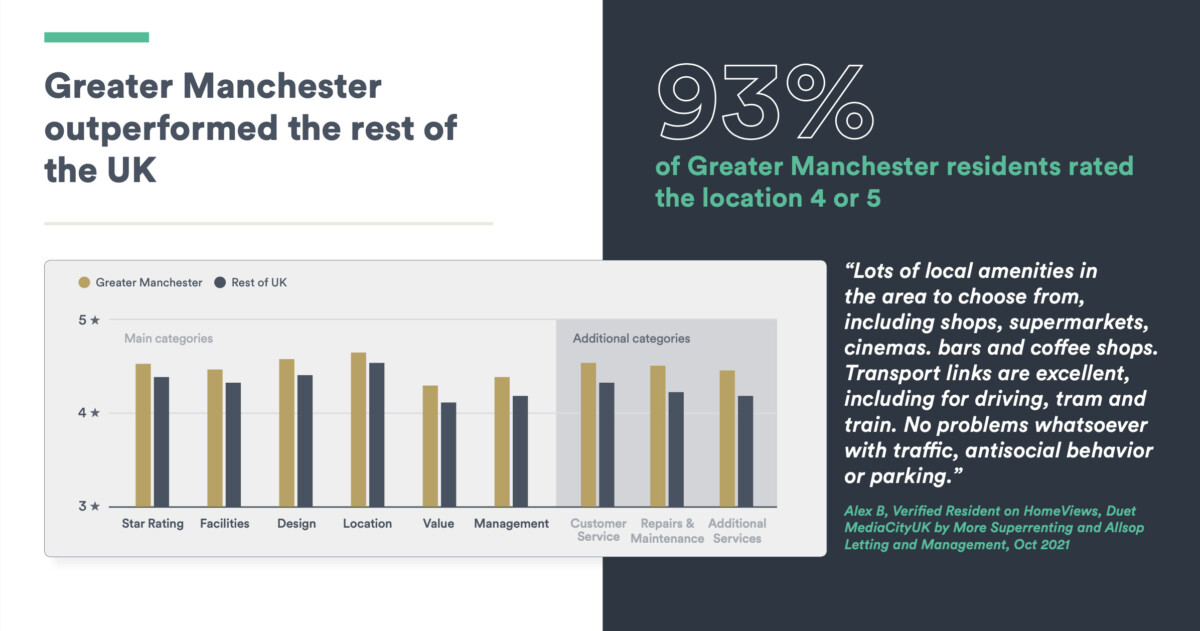The 2022 HomeViews Build to Rent Report revealed that Greater Manchester’s BTR schemes outperform developments in the rest of the UK across every review category. Local and industry experts recently joined HomeViews Co-founder Hannah Marsh on a webinar to explore why Manchester’s Build to Rent schemes are such a stellar success, and what the sector can learn from them. Below are the key findings from the webinar.
Manchester BTR’s UK dominance
Build to Rent schemes in Greater Manchester outperformed schemes in the rest of the UK across every review category on HomeViews, according to findings in our 2022 National Build to Rent Report (Download your free copy here).
We invited key figures in the Manchester BTR industry to participate in a webinar discussion on why Manchester is achieving so highly in this sector.

Webinar Panelists

Michael Howard – Managing Director


Paul Borrmann – Managing Director


Justin Harley – Regional Director


Dougie Orton-Wade – Asset Manager

Webinar findings: Why Manchester?
Manchester Culture
Innovation | Graft | Collaboration
Dougie

(18:32)
“It is absolutely about culture. Manchester’s a city with lots of individuality; it’s a diverse city that’s very accepting and there’s a lot of cohesion within the city. We seem to retain people in the city. I moved here 11 years ago – I fell in love with the city and never looked back. I wanted to stay here and that happens a lot.”
Michael

(13:08)
“It’s about the culture that we have as a city of innovators and pioneers: textiles, the Industrial Revolution, the modern computer, Suffragettes, graphene, football, (dare I say it) music… it’s in people’s DNA. Also confidence – some might call it cockiness, but there’s a can-do attitude in this city, and graft. We really work hard to not just be competitors but to work together, and HomeViews gives us a very consistent benchmark to do that with.”
Local Authorities & Relationships
Councils | Communities | Connections
Paul

(39:42)
“It’s about educating local councils that we’re not here to make a profit and disappear into the sunset. We’re here for the long term and we model 50-year budgets. It’s a really good thing for the local environment, over and above a build for sale product or standard PRS. Because we’re there the service level is better. We can integrate with the local environment – stakeholders, restaurants, etc. as well as offering commercial space. There are a lot of synergies between what local government wants and what we deliver.”
(41:18)
“In all our cities we do neighbourhood audits before we buy the land, to understand what the site would need or what we would like to offer. Then, as we’re going through mobilisation, we’re making partnerships with local independent businesses, so when we run any of our events we’re using local suppliers and producers rather than Amazon and Costco. Trying to be part of that in a local environment is key. From the ESG perspective the investor is going to really like that side as well.”
Michael

(29:25)
“Before BTR came along the leasehold residential market was working around unprofessional contract holders – landlords, developers in some cases. It was very short term – one, two years. Now we have contracts with institutions that are medium to long term, so our lines are drawn and we focus on what we’ve got.
“One of our vision statements is to make cities better places to live. That’s about how we contribute outside of what we do – with HomeViews, the UKAA – and sharing best practice. But it’s also sharing some of our mistakes with others who are like-minded so we move along a bit quicker.”
Operational structure
Research | Local Knowledge | Preparation
Michael

(30:11)
“Operational structure is key. We have a research team, a consultancy, mobilisation and an operational structure because we need to deeply understand the building and the neighbourhood before it’s even built. We need to know how it operates and what it costs.
“We have a consultancy team that basically gives the developer/institution/architect a really hard time. Having a seat at the design table means we eradicate friction and poor performance before it’s even built. You will not do it when the community is live – you do it at RIBA Stage 3 or before.”
(32:08)
“Don’t just drop people in to lease up a mobilisation – they need to be incubated just like that community is, otherwise they last five, ten minutes and they’re out again. It’s a really fierce time when you’re leasing up a new community in a new city.”
Paul

(36:47)
“I’ll bring the person who’s going to be running the site and more senior people in for six to nine months just to absorb the culture and learn from the group. I think if you don’t do that you’re planning to fail. That means going to other sites, not having anything else to do for a month but just go and be a sponge and meet the team.
“Obviously, it’s a structured onboarding – we just don’t send them out into the wild. You have to be prescriptive but also, you hire them for their culture, their beliefs and their passion and then can wind them up and let them go.”
Dougie

(51:03)
It’s so important that you’ve got cultural alignment with your service providers. The expectations have got to be clear to those service providers about what you’re trying to deliver. We’ve done that well in Manchester, we’ve seen those relationships really grow. Trying to keep things as local as possible is also felt by the residents and there’s that real community – not just internally but also externally, and that includes service providers.
Work with the Right People
Individuality | Risks | Reviews
Justin

(20:57)
“There is a real passion for customer care – we see this in operators in Manchester. A passion for the customer experience, for making that as frictionless and seamless as they possibly can. We see in our data that in Manchester, things like the use of the app is higher than in other regions. It’s the drive to improve the customer experience but also the drive to make time for their teams and their staff. Giving them time to spend with the customer is something that Dougie, Paul and Michael are all very passionate about and I think that’s not to be underestimated.”
Dougie

(19:21)
“It’s always about people because this is an experience-driven industry. I see Build to Rent as a hybrid role of hospitality, retail and property, and there are lots of people out there with transferable skills who want to get in. And Build to Rent communities need individuality – they have to have their differentiators to make people want to go there and stay there.”
(33:19)
“There’s two things that have really worked well for me. One of them is one of them is taking a few more on-paper risks – don’t just recruit somebody because of their C.V. It does a job but take some more risks. Get personality within the developments – that’s so fundamentally important. The other thing is giving as much autonomy as your organisation allows. The more autonomy you’re giving, the more creative people are going to be, in turn the experience is better and your noise stronger. HomeViews helps us to do that and that’s why it’s so important to us.
(34:44)
“The teams are so bought-into these HomeViews reviews. When you work so hard in a development and then read something like that it makes it all worth it. It’s why we’ve done so well. We love to win the awards, but the most enjoyment we get is just reading reviews with the teams and celebrating the success.”
Paul

(35:56)
“Autonomy is absolutely key for job enrichment and for motivation. It’s also very important to have a line in the sand in terms of standard operating procedure within your business. That is repeatable and keeps the consistency, service and compliance when looking to scale.”
(22:26)
“The reason we love HomeViews is it gives us a real, independent metric. You can’t cheat it, you can’t hide from the bad stuff and you can really connect and embrace the good stuff because it comes from the end user. HomeViews is a nice badge of honour but what it actually means is that the residents are happy and you can kind of really action any of their feedback.
“There’s friendly competition between Manchester operators – the teams know the only way to move your ranking and to get the feedback you want is by focusing on providing the service that then gets the reviews.”
Building Communities
The ‘New Amenity’ | Variety | Pain Points
Dougie

(32:55)
“When we won the award with Duet (Top National Development (less than 350 units) – HomeViews 2021 UKAA Awards), I went through each individual review and read them all. Something like 95% of them mentioned ‘community’ or ‘team’ within their review, compared to only around half of them mentioning amenities. I’ve heard this term quite a lot that ‘the community is the new amenity’ and it’s so true.
(47:37)
“Manchester’s also got so much choice now – we are maturing as a city. People are coming back to see seven, eight, nine schemes within their price point, location and what’s important to them. You’re going to be more satisfied if you’ve got choice and you don’t feel like you’ve been shoe-horned into something.”
Michael

(51:55)
“It’s about scale as well and what people are still comparing us to. We are still quite a small proportion of the whole rental market. When we look at the pains and the gains of the rental experience at the moment, I think we’re still just still getting rid of the pains. If you eliminate them in this market you’re pretty much an innovator, and we’re still trying to find the value-adds and the gains.”
Technology
Community Creation | Commercial Modelling
Justin

(26:55/59:43)
“Technology is absolutely fundamental to both community building and commercial modelling for Build to Rent. It’s only going to get more competitive so the focus on the customer will require technology to allow staff more time with those customers.
“On the commercial side there are many stakeholders – residents, staff, investors – and as more Built to Rent comes online there will be a need to look at operational efficiency as marginal gains become more important. So that’s everything from giving your staff the right tools at the concierge desk, your customers the right apps to engage, and measurements like unit turns – so the time it takes to market the unit – are really fundamental in terms of understanding costs.
“Where we have a number of operators operating buildings on behalf of investors, those investors demand information. They want to know they’re getting the returns they want, and whether to invest more in that area. So getting that data through technology is fundamental in terms of the commercial effectiveness of a building or a portfolio of buildings.”
HomeViews provides verified resident reviews of the UK’s housing developments. We’re working with developers, house builders, operators, housing associations and the Government to recognise high performers and help improve standards in the built environment.

















